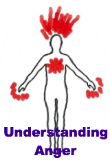Managing Emotions
Feed the Positive, Starve the Negative
by May Bleeker, 8 Aug 2010
Managing emotions is really about finding a way of being with your emotions that works for you and the people around you :)
When you get really good at it, you can extend this courtesy to other people. You can help others deal with their emotions more effectively too.
People who are good at doing both these things are often very nice to be around. I know someone like this, and his skill with emotions has brought him success both at work and with friends.
Molecules of Emotion
Whenever you feel a strong emotion, many chemical messengers rush around your system directing energy and resources away from and towards certain organs or physical systems in your body.
With fright or anger, for example, your digestive system slows down. Your heart speeds up. The pupils of your eyes widen. Your blood pressure rises. These all form part of what is called the 'fight or flight' response. It happens instinctively, whenever you feel threatened, to help you either 'fight' the threat, or successfuly 'run' from it.
Candace Pert describes the effect of these natural chemicals (peptides) in your system in her book Molecules of Emotion. In effect, when you feel bad, (or good), your whole body knows about it instantly through these chemical messengers, and responds to it instantly in a number of different ways.
These responses are meant to help you and protect you. For example, if you were walking along a nature trail and suddenly came across a snake, your jolt of fright and all the instant physical reactions that occur might help you quickly leap out of its way.
But ideally there should be an ebb and flow. After leaping away from the snake you should return to a calm, normal state. But unless your job takes you outdoors into nature, snakes are not the usual, everyday type of threat you will encounter. And managing emotions involves using your creativity to get back to a balanced state.
Getting Out of Survival Mode
Most of the time the type of 'threats' we experience are people cutting us off in traffic, or jumping red traffic lights and putting us in danger, or bosses or colleagues and work situations that cause us ongoing stress and anxiety.
It is harder to just 'jump away' from these types of stressors. Where do we jump to? If it's a bullying boss that gets us down, we still have to go back to work each morning to face him or her.
What happens is that we start to operate in a constantly amped up state.
When negative emotions occur again and again and become chronic, the effects on your body become chronic. Your body does not have a chance to return to a normal state. Over time, too many negative emotions harm your health. Managing these emotions is crucial to your long term well-being.
Obviously the opposite is also true! Lots of positive emotions can extend your life! Read about Dr Grossarth-Maticek's research on how attitudes affect health and longevity.
After an emotional upset, an important aspect of managing emotions is to try to get your mind and body back to a normal relaxed state as soon as you can. This is to minimise the effects that stress hormones and chemical messengers have on your physical wellbeing.
Here are some tips for managing emotions.
Managing Emotions Through Doing Something
George Henry Lewes said: "the only cure for grief is action".
In managing emotions, you can apply this to any strong feeling to good effect.
Doing something that involves physical exertion can take the edge off the intensity of the feelings you have and can help to clear your mind and reduce the urge to do something rash.
Going for a brisk walk or a run, or energetically vacuuming the lounge with your favourite music in the background are relatively easy ways to get moving. This is a positive way of managing emotions.
Take note - this is not meant to 'make the emotion disappear' (although it might). Or even to solve the 'problem' (if there is one that needs solving). It is simply a method of reducing the impact these emotions have on your body and your thoughts.
In a calmer state of mind you are likely to see things more reasonably and clearly and you will be in a better state to make decisions that are helpful to you and those around you.
Even if the emotion still remains afterwards you have still succeeded. You will at least have cleared some of the biological effects of the 'fight or flight' response from your system, and improved your health in this respect.
If nothing else, you will end up fitter, or with a cleaner carpet!
Managing Emotions Through Doing Nothing
One very effective method to bring your system to rest and calm your whole being is meditation.
In my experience, meditation is simply the practice of sitting and 'not doing'. It is the practice of just 'being'.
With meditation practice you are not "trying to relax" or "trying to be calm" or "trying to do or be anything". You are simply stopping for a chosen period of time (20 - 30 minutes at a time, twice a day is regarded as best), and "being" (in whatever state you happen to be in).
As soon as you start meditating you become more aware of your inner state, whether this is stressed, tired, anxious, up, down, or whatever. If your mind happens to be racing, don't make the mistake of thinking that you are somehow 'not doing it right' or 'not getting the proper effect'. There is no 'proper effect'.
You don't have to do anything but notice your inner state, whatever that may be, and continue your meditation for the chosen period of time.
With sufficient practice you will start to notice the calming effect on your life and general state of mind. Things seem clearer, actions seem to flow better. 'Good' and 'bad' events still happen, but greater clarity makes managing emotions easier.
In fact, I have found with some years of meditation that events do not have the same power to disturb my emotions as they used to.
I use the meditation practice I learnt at the School of Practical Philosophy.
Managing Emotions Through the Principle of Equal But Opposite Energy
I got the blues thinking of the future, so I left off and made some marmalade. It's amazing how it cheers one to shred oranges and scrub the floor. - D. H. Lawrence
(From the QI Book of Quotations: Advanced Banter, by J Lloyd & J Mitchinson)
When overcome with a strong feeling that upsets you, your mind often goes into overdrive, rehashing the event, or circling the problem again and again.
To break what can be a downward spiral, simply distract yourself with an activity that makes you feel good.
Bake cookies, go to the movies, watch your favourite TV comedy, or go out with some friends. The more of your senses it involves, the better.
Taking your mind off things and doing something that feels good is likely to restore a better frame of mind.
When choosing what to do, what I found works best is to choose a distraction that has an equal but opposite amount of energy.
For example, on a scale of 1-10, if what is upsetting you scores an "8", to really distract yourself and successfully turn your mind away from it, you will need to choose a 'feel good' activity that also scores an "8" in intensity.
Eating a really good ice-cream might distract you from a small upset. But unless it is a really powerful 'feel good' experience to eat an ice cream, you might need to search around a little to find the thing that really successfully makes you turn your experience from bad to good.
To get a head start on this, whenever you have an experience that makes you want to dance with delight - make a note of it somewhere, for when you need it.
Managing Emotions Means Feeding the Good, Starving the Bad
In his book Power vs Force, David R Hawkins points out that it doesn't help to resist or attack the things you don't want. To resolve problems you need to support the solution, not attack the apparent causes.
The Course in Miracles - a wonderful book of practical guidance expresses it very well:
What works through you, also works upon you.
In other words, if you are trying to reduce your feelings of anger, it doesn't help to fight anger, get angry about being angry, or say that it is 'wrong' to be angry. Nor will it necessarily help to talk about being angry, think about being angry, or even express anger (although this could be useful and the right thing to do in a particular time or place).
What might help to reduce anger is to recognize it, with kindness acknowledge to yourself that you are feeling it, and then to turn away from it. If part of that process is to express your anger, at the right time, in the right place and in an effective way (so that you can come to peace) - then that is what you do.
You may have heard the saying - what you give attention to, grows. Well, this is the same principle.
Instead of feeding the anger by giving it attention and dwelling on the perceived injustices, recognizing and acknowledging your own irritation can help you cope with your own feelings.
Feed what you want by giving it your attention, starve what you don't want by withdrawing your attention from it.
Managing Emotions Through Just Observing
According to Takahisa Kora:
"the key is to not resist or rebel against emotions or to try to get around them by devising all sorts of tricks: but to accept them directly, as they are."
When you next feel a strong emotion rising up, try "watching" your emotion, a technique suggested by Eckhart Tolle, in his book "Practicing the Power of Now".
Try to become aware of where in your body you can feel the emotion. Try to be very quiet within yourself, and just observe where the feeling is, and what it feels like. Does it feel hot or cold? Does it feel sharp or dull? Is it deep or wide? Just see what the feeling feels like inside you.
Then just let it be there. Don't try to do anything. Don't try to defend yourself. Don't blame the other person, yourself or the situation. Just feel. And be with this part of yourself in the kindest, gentlest way possible.
Just accept that this is how you feel right now, whether you like feeling it or not.
When you let your emotions be in this way, and pay attention, sometimes a clue arises. You might learn more about the situation and how it affects you.
When you accept your feelings you also realise that you have a choice in how to respond to the situation. You might not seem to have had a choice in how you feel - the feeling might arise without you wanting it to. But once it is there, simply name it, feel it and accept it.
And realise that what you do with this emotion is up to you, not the emotion.
If you find it difficult to feel your emotions, or name them, read more aboutUnderstanding Emotions or take a look at Understanding Anger for an exercise to help you explore and understand this particular emotion.
Before you can be effective at managing emotions, it helps to know what you are feeling.
Managing Emotions by 'Peeling Back the Onion'
You might find that when you practice the technique of watching and accepting a feeling, you start to see another emotion connected to it.
For example, lets say you watch and accept that you feel sad. But then you start to see that you feel something about feeling sad.
You might find that you feel a little angry at yourself for feeling so sad and down. Or you feel irritated that it affected your whole day.
When this happens, just go back to the previous step: Just Observe. Just name the emotions you see each time, and accept each of them whether you like the emotion or not.
For example:Ok. I am feeling really low right now. I also feel irritated that I feel sad, because it put a damper on my whole day.
Another layer:I feel really disappointed that my day was ruined. I wish I didn't feel this way.
Another layer:I feel really frustrated that I can't just 'snap out of it'.
And so on. As you peel back the layers and discover the emotions under them, just name them and accept them.
This act of noticing emotions, naming them and accepting them is part of managing emotions.
Emotions Are Information
What are your emotions telling you about the situation you are in?
Emotions are information, like an internal guidance system. Do you know what your emotions are telling you?
You may not be able to control what happens to you, or the feelings that rise up in response to these events. But you can decide what you DO in response to those feelings.
When you become more effective at managing emotions, you become more alert to the choices you are free to make.
Your emotions stop ruling your actions and you become better at managing yourself.
Return from Managing Emotions to Emotional IQ
Return from Managing Emotions to Doorway To Self Esteem Home Page







New! Comments
Your feedback is welcome: